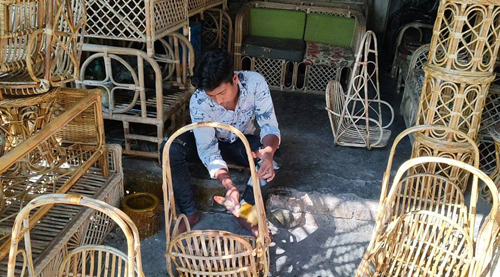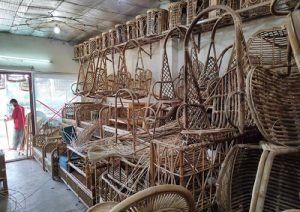
At one time in Rajshahi, starting from kula, most of the furniture including canvas, bed, sofa set, book shelf were made of cane. The cane industry was also highly valued as it was cheap and affordable. However, in the evolution of time, plastic, iron and plain sit furniture have taken the place of cane furniture. The traditional cane industry of Rajshahi has almost lost.
There are 9 cane factories and 2 showrooms in the metropolis. Some of these traders said that at one time there were 14 to 15 cane shops in Hosniganj Betpatti of the city. At present there are one shop each for Siddique, Farid and Abdul Quader. Those 3 shops sell furniture in Hosniganj from the closed gate area. Besides, the remaining 7 shops are near the medical campus. At present there are cane furniture factories in Bandhgate.
It is learned that in Rajshahi Central Jail also, at one time prisoners were made to do cane work. But over time, that is likely to change.
In this context, the current jail superintendent of Rajshahi Subrata Kumar Bala said, at present furniture made of bamboo is being made, not cane. At one time the work of this industry was also done in prisons. However, very soon the work will be done in the jail with the cane industry. The jail authorities also said that talks are underway.
In the evolution of time, some cane furniture has become extinct. Among the extinct pieces of furniture are rice husks, baskets, baskets, cane rugs or soap, hand fan, kula, changari, chalon, dhama, leaves and book shelves.
At present in the cane shops of Rajshahi are being made – wrappers, bookshelves, chairs, tea-tables, dining tables, sofa sets, various types of small and large swings, small and large rocking chairs. Several restaurants in Rajshahi, fancy office partitions, government rest houses and affluent wealthy families use a small range of cane furniture. At present, the demand for rocking chairs, swings, sofas and tea tables is the highest, the traders said.
Hosniganj Betpatti trader Alamgir said that at one time there were 14-15 shops on both sides of Betpatti in Hosniganj. But as the demand for cane products continues to decline, many have closed down their businesses. Now there are only three stores. They are selling cane and bamboo products as there is no demand.
Arif Hossain, a craftsman from Bandhgate, said, “I have been working in this profession since my childhood. I learned this job from my father. Now I am also a person of this profession. 20 to 22 years have passed working as a craftsman in cane industry.
Asked about the past and present of the cane industry, he said that at one time there was a lot of trade. Now the working conditions are not good. People are not available without some customers. However, most of the cane customers are rich and own office-restaurants.
Faridur Rahman, another trader from Bandhgate area, said that earlier there was more forest. It used to cultivate cane. As a result, cane was brought from Naogaon, Dinajpur, Sylhet and Chittagong at low prices. Apart from Sylhet and Chittagong, Rajshahi still has to buy cane from abroad. Although the price has increased several times, the price of cane products has not increased much.
He added that the artisans are also turning away from this profession due to declining demand. All in all, the cane crisis, labor crisis, low demand for the product in the market, the industry is booming. Saving this industry is now nothing but a challenge. Because we are old. It is not possible to go into an alternative profession. And no one is new to this profession.
According to the relevant sources, most of the cane is produced in Indonesia. The quality of cane produced in Indonesia is also the best. Cane is also grown in India, Bangladesh, Bhutan, Myanmar, Laos, Cambodia, Vietnam and Thailand. In Rajshahi, however, most cane comes from Myanmar, Indonesia and India.
Ahmed Ali Uddin, owner of Bichitra shop, said that at present chairs are sold for two to seven thousand rupees depending on the type. Sofa sets are sold for Tk 14 to 60 thousand , wrapped for Tk 500 to 1500 , 6 sets of dining for Tk 15 thousand to 60 thousand . Besides, the bed is available for Tk 5 to 60 thousand.
Information on cane industry was taken to Export Development Bureau Office, Rajshahi BSCIC Office and Rajshahi Agriculture Extension Department. But none of these offices matched the information about the cane industry. As a result, since there is no step for commercial cultivation of cane and its expansion, the cane industry is naturally losing its tradition.
Deputy General Manager of Rajshahi BSCIC Zafar Biojid said, they are trying to keep this industry alive.They will do the same if the traders tell us about their problems. They will also try to provide necessary training and financial assistance to the people involved in this industry. But no one communicates about it.